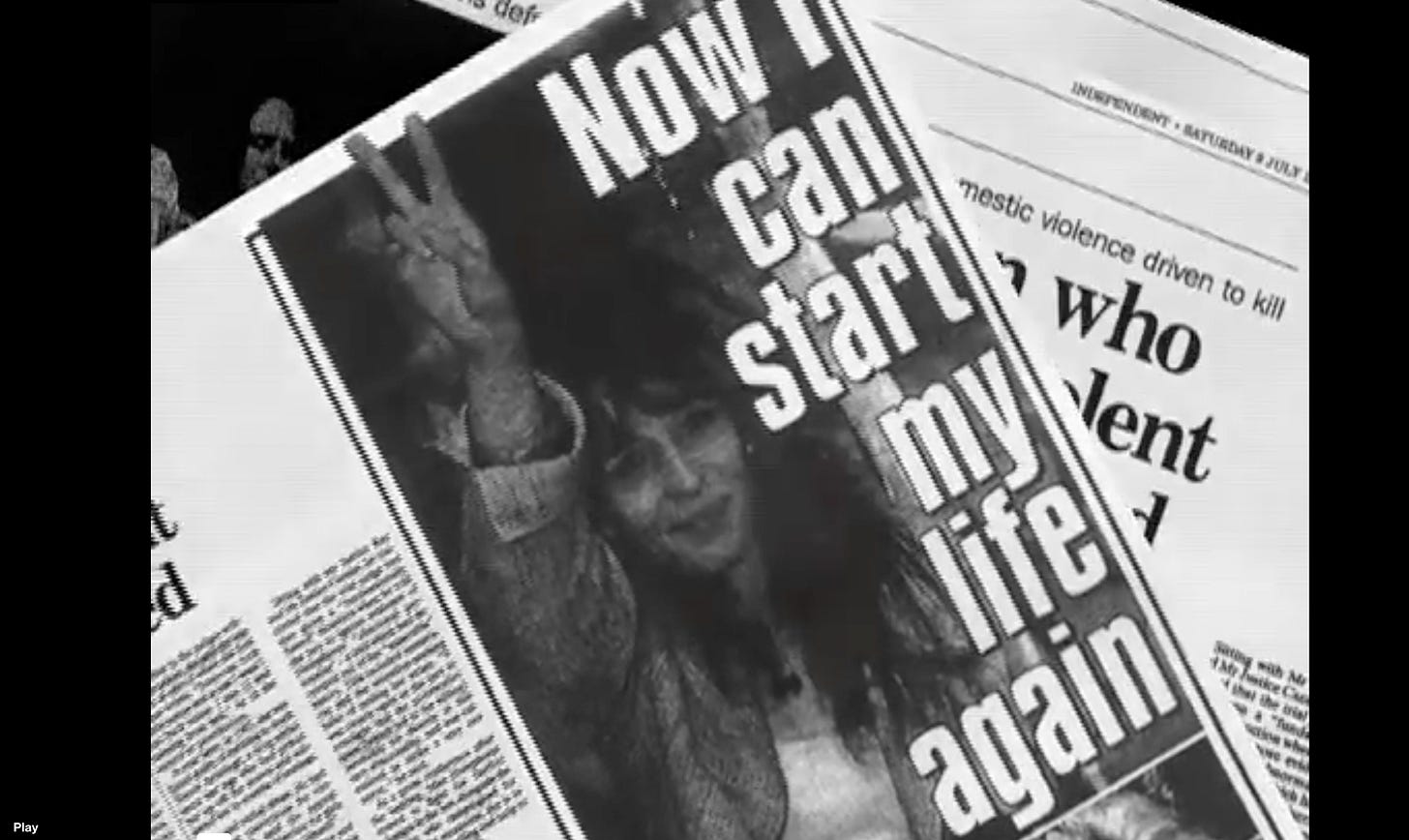Free Emma Humphreys! Self Defence is No Offence!
Description
Today is the 30th anniversary of Emma Humphreys’ successful appeal against her murder conviction. Justice for Women, set up in 1991 (by myself and a small group of other feminists) campaigned alongside Emma for her release, and to quash her murder conviction and replace with one of manslaughter.
Tragically, Emma died, of an accidental overdose, three years after her release, in 1998. You can read about her case, and the campaign, in the article below, published weeks after Emma was freed.
Sisters to the death
Two months ago Emma Humphreys and Sara Thornton were both in prison serving life sentences for murdering their men. Now they are out - one after a successful appeal, one on bail. They know whom to thank: a small group of angry women whose commitment knows no bounds and who require that Humphreys and Thornton now join them in their battle against the oppressions of masculine justice. In the war between the sexes, this is the front line.
E. Jane Dickson reports
July 1995: Julie Bindel with Emma Humphreys, minutes after leaving the Court of Appeal, her murder conviction quashed
Emma Humphreys studies the Tarot. She knows, because she has seen it in the cards, that somewhere in her life there is a man who will take care of her. There was a man, years ago, who told Emma he loved her and wanted to protect her. But Trevor Armitage died in 1985. Emma killed him. At 28, Emma Humpreys looks and sounds 14. She speaks with affection of the 25 stuffed animals who share her bed, and uses two hands to lift a glass of Jack Daniels and Coke to her lips. Jangly bangles mask a tracery of slash-marks on her wrists, and a short, denim playsuit flaps loose around her bone-thin frame. It beggars belief that this affectingly frail figure could overpower a man twice her age and size. But she did. She took two knives and stabbed him, and she served ten years of a life sentence for murder. Freed last July after an intensive four-and-a half year campaign by the feminist pressure group, Justice for Women, Humphreys now lives as part of a therapeutic community in Kent. Her voice still shakes when she talks about Trevor Armitage. She will not - or cannot - pronounce his name, but she is absolutely sure of what she has to say: ' "His death was the biggest cry for help I ever made in my entire life."
When Emma first met Armitage, she was 16 and working as a prostitute. Armitage, 32, was one of her clients. Not the most romantic circumstances for a love affair, but Emma wasn't brought up with big ideas of romance. As a child, she regularly witnessed the violent abuse of her alcoholic mother by her alcoholic step-father. At 12, she tried to kill herself; and at 13 she was living on the streets and supporting herself by prostitution and casual work in the porn industry. Armitage was no white knight. He had a history of violent assault, and was known to the Vice Squad, but, when he offered affection and shelter in his home, Emma gratefully accepted. During the six months the couple lived together, Armitage subjected her to continuous emotional and sexual abuse. He didn't mind her earning money as a prostitute, but he was prone to fits of jealous rage. When, in the course of work, Emma was gang-raped and felt unable to continue a sexual relationship with Armitage, he raped her himself. Repeatedly.
As a child, she regularly witnessed the violent abuse of her alcoholic mother by her alcoholic step-father. At 12, she tried to kill herself; and at 13 she was living on the streets and supporting herself by prostitution and casual work in the porn industry.
On the night of February 25, 1985, Armitage was in a worse than usual mood. Earlier in the evening, he and Emma had gone to the pub with two other men, and Armitage had proposed a "gang bang". When they got home, Emma went upstairs and slit her wrists, then panicked and hid the knives under her body. Armitage stripped and lay down beside her, and Emma, knowing that he would want sex, and fearing that he would find the weapons and use them against her, stabbed him once in the stomach. He died soon afterwards. In court, Emma's plea of manslaughter on grounds of provocation was denied. She was convicted of murder and detained at Her Majesty's Pleasure (there is no time limit on the sentence handed down to juveniles for murder). In prison she made 12 more attempts on her own life, and battled with anorexia nervosa. "Perhaps," said Mr Justice Jones, presiding at Emma's trial, "it is the best possible sentence that could be passed upon her in her own interest."
The sentencing of women who kill their abusive partners is this season's legal hot potato. With the highly publicised release of Humphreys in July, and the granting of bail to Sara Thornton in August, public opinion has focused on a criminal justice system which often appears to treat women accused of murdering violent men with a summary harshness one step removed from the ducking stool.








